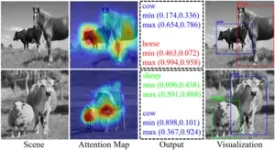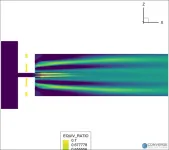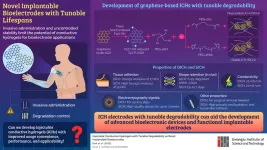(Press-News.org) Strategies to treat pain without triggering dangerous side effects such as euphoria and addiction have proven elusive. For decades, scientists have attempted to develop drugs that selectively activate one type of opioid receptor to treat pain while not activating another type of opioid receptor linked to addiction. Unfortunately, those compounds can cause a different unwanted effect: hallucinations. But a new study led by Washington University School of Medicine in St. Louis has identified a potential route to pain relief that neither triggers addiction nor activates the pathway that causes hallucinations.
The research is published May 3 in the journal Nature.
Painkilling drugs such as morphine and oxycodone, as well as illegal street drugs such as heroin and fentanyl, activate what are known as mu opioid receptors on nerve cells. Those receptors relieve pain but also cause euphoria — the feeling of being high — and that feeling contributes to addiction. An alternative strategy is to target another opioid receptor, called the kappa opioid receptor. Scientists attempting to make drugs that target only the kappa receptor have found that they also effectively relieve pain, but they can be associated with other side effects such as hallucinations.
Researchers at the Center for Clinical Pharmacology at Washington University School of Medicine and the University of Health Sciences & Pharmacy, also in St. Louis, have identified the potential mechanisms behind such hallucinations, with the goal of developing painkillers without this side effect. Using electron microscopes, they identified the way that a natural compound related to the salvia plant selectively binds only to the kappa receptor but then causes hallucinations.
“Since 2002, scientists have been trying to learn how this small molecule causes hallucinations through kappa receptors,” said principal investigator Tao Che, PhD, an assistant professor of anesthesiology. “We determined how it binds to the receptor and activates potential hallucinogenic pathways, but we also found that other binding sites on the kappa receptor don’t lead to hallucinations.”
Developing new drugs to target these other kappa receptor binding sites may relieve pain without either the addictive problems associated with older opioids or the hallucinations associated with the existing drugs that selectively target the kappa opioid receptor.
Targeting the kappa receptor to block pain without hallucinations would be an important step forward, according to Che, because opioid drugs that interact with the mu opioid receptor have led to the current opioid epidemic, causing more than 100,000 overdose deaths in the U.S. in 2021.
“Opioids, especially synthetic opioids such as fentanyl, have contributed to far too many overdose deaths,” Che said. “There’s no doubt we need safer pain-relieving drugs.”
Che’s team, led by first author Jianming Han, PhD, a postdoctoral research associate in Che’s laboratory, found that a class of signaling proteins called G proteins cause the kappa opioid receptor to activate several different pathways.
“There are seven G proteins linked to the kappa receptor, and although they are very similar to each other, the differences between the proteins may help explain why some compounds can cause side effects such as hallucinations,” Han said. “By learning how each of the proteins binds to the kappa receptor, we expect to find ways to activate that receptor without causing hallucinations.”
The function of the G proteins has largely been unclear until now, particularly the protein that activates the pathway lined to hallucinations.
“All of these proteins are similar to one another, but the specific protein subtypes that bind to the kappa receptor determine which pathways will be activated,” Che said. “We have found that the hallucinogenic drugs can preferentially activate one specific G protein but not other, related G proteins, suggesting that beneficial effects such as pain relief can be separated from side effects such as hallucinations. So we expect it will be possible to find therapeutics that activate the kappa receptor to kill pain without also activating the specific pathway that causes hallucinations.”
Han J, Zhang J, Nazarova AL, Bernhard SM, Krumm BE, Zhao L, Lam JH, Rangari VA, Majumdar S, Nichols DE, Katritch V, Yuan P, Fay JF, Che, T. Ligand and G protein selectivity in kappa opioid receptor. Nature, May 3, 2023.
The study was funded with support from the National Institute of General Medical Sciences and the National Institute of Neurological Disorders and Stroke of the National Institutes of Health (NIH). Grant numbers: R35 GM143061 and R01 NS099341.
About Washington University School of Medicine
WashU Medicine is a global leader in academic medicine, including biomedical research, patient care and educational programs with 2,800 faculty. Its National Institutes of Health (NIH) research funding portfolio is the third largest among U.S. medical schools, has grown 52% in the last six years, and, together with institutional investment, WashU Medicine commits well over $1 billion annually to basic and clinical research innovation and training. Its faculty practice is consistently within the top five in the country, with more than 1,800 faculty physicians practicing at 65 locations and who are also the medical staffs of Barnes-Jewish and St. Louis Children’s hospitals of BJC HealthCare. WashU Medicine has a storied history in MD/PhD training, recently dedicated $100 million to scholarships and curriculum renewal for its medical students, and is home to top-notch training programs in every medical subspecialty as well as physical therapy, occupational therapy, and audiology and communications sciences.
END
Discovery suggests route to safer pain medications
Targeting opioid receptor pathway could treat pain without addiction, hallucinations
2023-05-03
ELSE PRESS RELEASES FROM THIS DATE:
XFELs show the final milliseconds of oxygen formation
2023-05-03
For the first time, scientists have been able to see the crucial final step in the reaction cycle of Photosystem II, during which oxygen is formed. Using serial femtosecond crystallography performed with the XFEL technique, they have managed to obtain more information on the interaction between Photosystem II and the Mn/Ca cluster. This has been shown in a new study by Uppsala University, published in the journal Nature.
The oxygen we breathe is produced by plants, algae and cyanobacteria, which use the energy of sunlight for powering the formation of oxygen. This is done by the Photosystem II enzyme, ...
To boost cancer immunotherapy’s fighting power, look to the gut
2023-05-03
Cancer immunotherapy has transformed the treatment of many types of cancer. Yet, for reasons that remain poorly understood, not all patients get the same benefit from these powerful therapies.
One potent factor in treatment outcome appears to be an individual’s gut microbiota — the trillions of microorganisms that live in the human intestine — according to new research led by investigators at Harvard Medical School and Dana-Farber Cancer Institute.
The study, done in mice and published May 3 in Nature, pinpoints how gut microbes enhance the body’s response to a common type of immunotherapy known as PD-1 checkpoint ...
Minoan eruption survey improves volcanic risk assessments
2023-05-03
Volcanic eruptions are spectacular, violent and dangerous. Large explosive eruptions can even have global impacts. To classify the size of volcanic eruptions, the magma volume and the deposition volume are determined. Volcanologists estimate these values in order to compare the size of different volcanic eruptions or to obtain a measure of the explosiveness of the eruption. However, it is often not possible to determine the values accurately. This makes it difficult to infer the actual volume of magma and to measure the complete extent of such eruptions. In particular, because the deposits of the most violent historical eruptions are partially or completely under water, which makes geological ...
Indo-Pacific corals more resilient to climate change than Atlantic corals
2023-05-03
UNIVERSITY PARK, Pa. — In the face of global warming and other environmental changes, corals in the Atlantic Ocean have declined precipitously in recent years, while corals in the Pacific and Indian Oceans are faring better. By describing several species of symbiotic algae that these corals need to grow, an international team led by Penn State has found that these mutualistic relationships from the Indo-Pacific may be more flexible and ultimately resilient to higher ocean temperatures than those in the Atlantic.
Coral reefs are vast geological structures made of calcium carbonate produced by coral animals whose colonies possess dense populations ...
More woodlands will not impact tourism
2023-05-03
Hiking, cycling, climbing and boating. When we take time off from work or school, we like to go out into nature. The landscape in other words play an important role for our vacations. To promote biodiversity and carbon sequestration there is a focus on planting more trees, especially in upland areas such as Howgill Fells. The Howgill Fells is located in the north-west of England and is known for its soft, rolling and open landscape. It is a popular area for tourists seeking the outdoors and hill-walking in particular. But how ...
Used coffee pods can be recycled to produce filaments for 3D printing
2023-05-03
An article published in the journal ACS Sustainable Chemistry & Engineering brings good news for coffee buffs: the plastic in used coffee pods can be recycled to make filament for 3D printers, minimizing its environmental impact.
The solution was successfully tested by research groups in Brazil at the Federal University of São Carlos (USFCar) and the State University of Campinas (UNICAMP), and in the United Kingdom at Manchester Metropolitan University (MMU).
“We produced new conductive and non-conductive filaments from waste polylactic acid [PLA] from used coffee machine ...
American Stroke Association names 2023 Stroke Heroes
2023-05-03
DALLAS, May 3, 2023 — Six local stroke heroes from across the country are being recognized by the American Stroke Association, a division of the American Heart Association, for their resiliency and dedication to rise up against stroke. Approximately 800,000 Americans have a stroke each year,[1] a leading cause of disability in the U.S., and one in four survivors will have another one.
The American Stroke Association’s annual Stroke Hero Awards honors stroke survivors, health care professionals and family caregivers. The ...
SwRI designs safer, more effective hydrogen injector for gas turbines
2023-05-03
SAN ANTONIO — May 3, 2023 —Southwest Research Institute is designing innovative hydrogen combustion systems for gas turbines used in power generation. The designs prevent flashback, a common concern in hydrogen-fueled combustion systems wherein the flame from the combustor travels into the nozzle, which can result in damaged equipment.
Hydrogen fuel has numerous benefits including the fact that it produces no carbon emissions during the combustion process. However, one of the things that is especially challenging is that it’s highly reactive, which makes it more difficult to work with than natural gas or the liquid fuels ...
Gwangju Institute of Science and Technology researchers enhance thermoelectricity with guided impurity position control
2023-05-03
Thermoelectric materials, substances that convert temperature difference into electricity, find a multitude of applications involving the conversion of waste heat into useful electrical energy. However, they often need to rely on heavy rare earth elements for efficient thermoelectric conversion. This, unfortunately, makes them expensive and environmentally hazardous. In recent years, conjugated polymer-based material has received attention as an environmentally benign alternative to the conventional rare earth metal-based thermoelectric materials.
Owing to their high ...
High-throughput experiments might ensure a better diagnosis of hereditary diseases
2023-05-03
Researchers at the Department of Biology, University of Copenhagen, have now contributed to solving this problem for a specific gene called GCK. The study has just been published in Genome Biology.
Figure: GCK gene
Rasmus Hartmann-Petersen, Professor at the Department of Biology, explains:
- “The GCK gene, which codes for the enzyme glucokinase, regulates the secretion of insulin in the pancreas. GCK gene variants can therefore cause a form of hereditary diabetes. ...
LAST 30 PRESS RELEASES:
Iron deficiency blocks the growth of young pancreatic cells
Selective forest thinning in the eastern Cascades supports both snowpack and wildfire resilience
A sea of light: HETDEX astronomers reveal hidden structures in the young universe
Some young gamers may be at higher risk of mental health problems, but family and school support can help
Reduce rust by dumping your wok twice, and other kitchen tips
High-fat diet accelerates breast cancer tumor growth and invasion
Leveraging AI models, neuroscientists parse canary songs to better understand human speech
Ultraprocessed food consumption and behavioral outcomes in Canadian children
The ISSCR honors Dr. Kyle M. Loh with the 2026 Early Career Impact Award for Transformative Advances in Stem Cell Biology
The ISSCR honors Alexander Meissner with the 2026 ISSCR Momentum Award for exceptional work in developmental and stem cell epigenetics
The ISSCR honors stem cell COREdinates and CorEUstem with the 2026 ISSCR Public Service Award
Minimally invasive procedure effectively treats small kidney cancers
SwRI earns CMMC Level 2 cybersecurity certification
Doctors and nurses believe their own substance use affects patients
Life forms can planet hop on asteroid debris – and survive
Sylvia Hurtado voted AERA President-Elect; key members elected to AERA Council
Mount Sinai and King Saud University Medical City forge a three-year collaboration to advance precision medicine in familial inflammatory bowel disease
AI biases can influence people’s perception of history
Prenatal opioid exposure and well-being through adolescence
Big and small dogs both impact indoor air quality, just differently
Wearing a weighted vest to strengthen bones? Make sure you’re moving
Microbe survives the pressures of impact-induced ejection from Mars
Asteroid samples offer new insights into conditions when the solar system formed
Fecal transplants from older mice significantly improve ovarian function and fertility in younger mice
Delight for diastereomer production: A novel strategy for organic chemistry
Permafrost is key to carbon storage. That makes northern wildfires even more dangerous
Hairdressers could be a secret weapon in tackling climate change, new research finds
Genetic risk for mental illness is far less disorder-specific than clinicians have assumed, massive Swedish study reveals
A therapeutic target that would curb the spread of coronaviruses has been identified
Modern twist on wildfire management methods found also to have a bonus feature that protects water supplies
[Press-News.org] Discovery suggests route to safer pain medicationsTargeting opioid receptor pathway could treat pain without addiction, hallucinations






